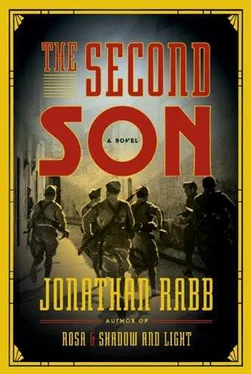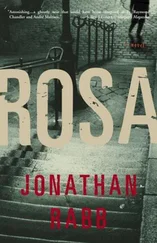Jonathan Rabb - The Second Son
Здесь есть возможность читать онлайн «Jonathan Rabb - The Second Son» весь текст электронной книги совершенно бесплатно (целиком полную версию без сокращений). В некоторых случаях можно слушать аудио, скачать через торрент в формате fb2 и присутствует краткое содержание. Жанр: Политический детектив, на английском языке. Описание произведения, (предисловие) а так же отзывы посетителей доступны на портале библиотеки ЛибКат.
- Название:The Second Son
- Автор:
- Жанр:
- Год:неизвестен
- ISBN:нет данных
- Рейтинг книги:4 / 5. Голосов: 1
-
Избранное:Добавить в избранное
- Отзывы:
-
Ваша оценка:
- 80
- 1
- 2
- 3
- 4
- 5
The Second Son: краткое содержание, описание и аннотация
Предлагаем к чтению аннотацию, описание, краткое содержание или предисловие (зависит от того, что написал сам автор книги «The Second Son»). Если вы не нашли необходимую информацию о книге — напишите в комментариях, мы постараемся отыскать её.
The Second Son — читать онлайн бесплатно полную книгу (весь текст) целиком
Ниже представлен текст книги, разбитый по страницам. Система сохранения места последней прочитанной страницы, позволяет с удобством читать онлайн бесплатно книгу «The Second Son», без необходимости каждый раз заново искать на чём Вы остановились. Поставьте закладку, и сможете в любой момент перейти на страницу, на которой закончили чтение.
Интервал:
Закладка:
Only two of the other tables were occupied: a trio of officers sat knee to knee as they sipped silently through bowls of something brown; closer to the door an old priest was reading a newspaper and drinking from a glass of yellow liquid. He looked up with a gentle smile as Hoffner stepped inside. Mila’s own escort stood by the bar with a cup of chocolate and a plate of churros. The strips of dough were powdered and had left white specks under his nose. They made the man’s sharp nod to Hoffner’s lieutenant somewhat less imposing.
Hoffner drew up to Mila’s table. The lieutenant was now with his friend at the bar, delicately trying to inform him of the powder. There was a flurry of nose activity over Hoffner’s shoulder, and Mila said, “Everything all right?”
Hoffner nodded. The brother looked up with the same features as his father, although here they were hidden behind a neatly cropped beard and mustache. It was unclear whether he had been crying, but the eyes showed a heaviness. He stood. He was tall like his sister.
Hoffner said, “Sergeant Piera.”
“Senor Hoffman.”
Mila corrected. “Hoffner.”
Piera looked at his sister. His mind was clearly elsewhere. He looked again at Hoffner. “Yes, of course. Senor Hoffner. My apologies.”
Hoffner motioned to the chairs, and the two men sat. Mila said nothing, and Piera went back to his letter. Hoffner noticed a loose stack of perhaps twenty on the chair beside him, a brown piece of twine at the side. Three of the letters had already been opened and read.
Mila kept her eyes on her brother as he flipped to the back of the one in his hand, read it, and set it down. He stared for several moments before saying, “That’s the last?” His eyes remained fixed on the table.
“Yes,” said Mila.
Piera’s eyes moved as if he were reading something only he could see. “She wrote well.”
“She did.”
He nodded. His mind was struggling to find its way back. The eyes filled and his breathing became heavier, but he refused to cry. Mila placed her hand on his.
She said, “I don’t like the beard.”
Even his smile showed pain. “Then you’re lucky you don’t have to see it that often.” He looked at Hoffner. “Forgive me. A friend has died. I’ve just been told of it.”
It was clearly more, but Hoffner knew to say only, “I’m sorry.”
Piera tried to move past it. “You’ve been to see Captain Doval?”
“Yes.”
“And you’ve come from Barcelona?”
Hoffner nodded. He had no intention of opening this up, but Piera saved him by saying, “Thank you, then. For bringing Mila. I won’t take any more of your time.”
Piera stood. He reached down and collected the letters, and Hoffner noticed how large the hands were. Odd to notice that, he thought. He watched as Piera embraced his sister. Mila was not so good with the tears. She rubbed her eyes against her brother’s shoulder. Piera released her and said, “It’s a bit strange, isn’t it?”
She stared into his face. “Yes. It is.”
“To see each other this way.”
They were finding anything to keep him from going. She nodded. “Yes.”
Piera looked at Hoffner. “She’s a doctor, you know. Did you know that?” Hoffner nodded and Piera tried a ragged smile. “Of course you knew. We could use doctors this side, too.” He looked at his sister and seemed momentarily confused.
Her eyes filled, and she said, “Be well, Carlos. God be with you.”
Piera stared a moment longer and then nodded. He looked again at Hoffner and went past him. As he walked to the door, Piera set his beret on his head. He opened the door and stepped out onto the street.
Mila watched him through the glass, even when she could no longer see him.
She said, “I asked him to come with us.”
Hoffner could only imagine that moment.
“We should go,” he said. He turned to the soldiers at the bar. “Lieutenant.” He was once again the man from Berlin. “Bring my car around. And I’ll have a cup of the chocolate with the-” He pointed to the strips of dough.
“Churros,” the man said.
“Yes. And call ahead to the city’s southern barricade. The road to Teruel. Tell them to expect us in the next half hour.”
The sky took on a deep blue just before sunset, softening a landscape that was growing more desolate by the hour. The few patches of green now came as sudden eruptions, clumps on a hillock or straggling weeds of wild brush that seemed beaten down by earth and rocks. It was a place unchanged for centuries, and it made the past a kind of comfort.
There had been no further contact with Captain Doval. The car had appeared fully gassed; the two lieutenants had been sent on their way. Nonetheless, it was now more than an hour, and Hoffner was still expecting to peer into the rearview mirror and see the dust of an approaching car rising in the distance.
Mila was staring out, her head resting back against the seat. She had slipped in and out of sleep, barely moving, not even to swat the fly that seemed incapable of finding its way to an open window. The thing battered itself against the dashboard, and she began to follow the lazy line of telephone poles, one after the other after the other.
Hoffner was fighting off his own exhaustion, the strain from his performance still knotted in his neck. Even the miracle of having come through did nothing to help. His head felt light, and there was a tackiness at the back of his throat. He imagined that nausea would follow, but for now he focused on the road.
Again he glanced in the mirror, and Mila said, “Either they’re coming or they’re not. Staring in the mirror won’t change it.”
She was suddenly aware of the fly. She followed its flight, cupped it in her hands, and held it before releasing it at the window. She closed her eyes and let the last of the sun stretch across her face.
It was nearly a minute before she said, “Do you ever miss her-your wife?”
Hoffner felt the back of his neck compress.
He had been foolish just beyond the city. He had let her ask questions. More foolish, he had answered them. Now she had Martha’s death and Sascha’s hatred to toss back at him. Seventeen years removed and he still felt the stale taste of his own arrogance in his mouth. The Nazis had been nothing then-nothing but a distant rumbling from Munich and the south. And yet he had underestimated them. He had dismissed them as thugs and charlatans, and they had murdered his wife. To have his son blame him for her death and to let them steal his Sascha away-maybe that was what lingered in his throat.
He had no strength for that past.
“The girl in the letters,” he said. “She was his wife?”
Mila took a moment before answering. “Near enough. It was a long time ago.” She opened her eyes and stared out. “She never sent them. She was killed in the fighting last week.” She looked over at him. “Do you ever miss her?”
Hoffner peered into the mirror. “No,” he said. He focused on the road ahead. “I don’t think I do.”
She nodded quietly and turned again to the window. “He was a doctor, my husband. At a clinic in the Raval. I was a terrible nurse.”
Hoffner was glad for the lift in her voice. “I don’t believe that.”
“I was. It’s what you get when you have a twenty-year-old who knows better than everyone else. They all hated me.”
“Except for this doctor of yours.”
“Yes.”
“He fell in love with you?”
“He did.”
“And he trained you?”
She smiled, recalling something. “No. He was much more of an idealist than that. He married me and took me to Moscow.”
“How romantic.”
The smile remained. “The Revolution was good for opening all those doors. He found me a place at one of the medical academies: Sechanov-old, prestigious. He was at a prison hospital: Butyrki, I think. Funny how you forget those things.”
Читать дальшеИнтервал:
Закладка:
Похожие книги на «The Second Son»
Представляем Вашему вниманию похожие книги на «The Second Son» списком для выбора. Мы отобрали схожую по названию и смыслу литературу в надежде предоставить читателям больше вариантов отыскать новые, интересные, ещё непрочитанные произведения.
Обсуждение, отзывы о книге «The Second Son» и просто собственные мнения читателей. Оставьте ваши комментарии, напишите, что Вы думаете о произведении, его смысле или главных героях. Укажите что конкретно понравилось, а что нет, и почему Вы так считаете.












